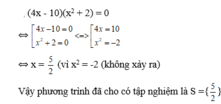Giải các phương trình sau:
Hãy nhập câu hỏi của bạn vào đây, nếu là tài khoản VIP, bạn sẽ được ưu tiên trả lời.



a: \(\Leftrightarrow\left(4x+14\right)^2-\left(3x+9\right)^2=0\)
=>(4x+14+3x+9)(4x+14-3x-9)=0
=>(7x+23)(x+5)=0
=>x=-23/7 hoặc x=-5
\(a,\\ \Leftrightarrow7x^2+58x+115=0\\ \Leftrightarrow\left(x+5\right)\left(7x+23\right)=0\\ \Leftrightarrow\left\{{}\begin{matrix}x+5=0\\7x+23=0\end{matrix}\right.\Leftrightarrow\left\{{}\begin{matrix}x=-5\\x=-\dfrac{23}{7}\end{matrix}\right.\)
\(b,\\ \Leftrightarrow\left[\left(x+1\right)\left(x+5\right)\right]\left[\left(x+3\right)\left(x+4\right)\right]=0\\ \Leftrightarrow\left(x^2+6x+5\right)\left(x^2+6x+8\right)=0\\ \LeftrightarrowĐặt.x^2+6x+5=a\\ \Leftrightarrow a=a\left(a+3\right)=10\\ \Leftrightarrow a^2+3a-10=0\\ \Leftrightarrow\left(a+5\right)\left(a-2\right)=0\\ \Leftrightarrow\left[{}\begin{matrix}a=-5\\a=2\end{matrix}\right.\Rightarrow\left[{}\begin{matrix}x^2+6x+5=-5\\x^2+6x+5=2\end{matrix}\right.\\ \Leftrightarrow\left[{}\begin{matrix}x^2+6x+10=0\\x^2+6x+3=0\end{matrix}\right.\\ \left(Vô.n_o\Delta=36-40=-4< 0\right)\)
\(\Leftrightarrow\left[{}\begin{matrix}x=-3+\sqrt{6}\\x=-3-\sqrt{6}\end{matrix}\right.\)

ĐKXĐ: \(x\neq 0\).
Đặt \(\dfrac{x}{3}-\dfrac{4}{x}=t\).
PT đã cho tương đương:
\(3t^2+8-10t=0\)
\(\Leftrightarrow\left(t-2\right)\left(3t-4\right)=0\)
\(\Leftrightarrow\left[{}\begin{matrix}t=2\\t=\dfrac{4}{3}\end{matrix}\right.\).
Với t = 2 ta có \(\dfrac{x}{3}-\dfrac{4}{x}=2\Leftrightarrow\dfrac{x^2-12}{3x}=2\Leftrightarrow x^2-6x-12=0\Leftrightarrow x=\pm\sqrt{21}+3\).
Với t = \(\frac{4}{3}\) ta có \(\dfrac{x}{3}-\dfrac{4}{x}=\dfrac{4}{3}\Leftrightarrow\dfrac{x^2-12}{3x}=\dfrac{4}{3}\Leftrightarrow x^2-12=4x\Leftrightarrow x^2-4x-12=0\Leftrightarrow\left[{}\begin{matrix}x=4\\x=-2\end{matrix}\right.\).
Vậy...

c.
\(\Leftrightarrow cos\left(x+12^0\right)+cos\left(90^0-78^0+x\right)=1\)
\(\Leftrightarrow2cos\left(x+12^0\right)=1\)
\(\Leftrightarrow cos\left(x+12^0\right)=\dfrac{1}{2}\)
\(\Leftrightarrow\left[{}\begin{matrix}x+12^0=60^0+k360^0\\x+12^0=-60^0+k360^0\end{matrix}\right.\)
\(\Rightarrow\left[{}\begin{matrix}x=48^0+k360^0\\x=-72^0+k360^0\end{matrix}\right.\)
2.
Do \(-1\le sin\left(3x-27^0\right)\le1\) nên pt có nghiệm khi:
\(\left\{{}\begin{matrix}2m^2+m\ge-1\\2m^2+m\le1\end{matrix}\right.\) \(\Leftrightarrow\left\{{}\begin{matrix}2m^2+m+1\ge0\left(luôn-đúng\right)\\2m^2+m-1\le0\end{matrix}\right.\)
\(\Rightarrow-1\le m\le\dfrac{1}{2}\)
a.
\(\Rightarrow\left[{}\begin{matrix}x+15^0=arccos\left(\dfrac{2}{5}\right)+k360^0\\x+15^0=-arccos\left(\dfrac{2}{5}\right)+k360^0\end{matrix}\right.\)
\(\Rightarrow\left[{}\begin{matrix}x=-15^0+arccos\left(\dfrac{2}{5}\right)+k360^0\\x=-15^0-arccos\left(\dfrac{2}{5}\right)+k360^0\end{matrix}\right.\)
b.
\(2x-10^0=arccot\left(4\right)+k180^0\)
\(\Rightarrow x=5^0+\dfrac{1}{2}arccot\left(4\right)+k90^0\)

Mình khuyên bạn thế này :
Bạn nên tách những câu hỏi ra
Như vậy các bạn sẽ dễ giúp
Và cũng có nhiều bạn giúp hơn !
Bài 1.
a) ( x - 3 )( x + 7 ) = 0
<=> x - 3 = 0 hoặc x + 7 = 0
<=> x = 3 hoặc x = -7
Vậy S = { 3 ; -7 }
b) ( x - 2 )2 + ( x - 2 )( x - 3 ) = 0
<=> ( x - 2 )( x - 2 + x - 3 ) = 0
<=> ( x - 2 )( 2x - 5 ) = 0
<=> x - 2 = 0 hoặc 2x - 5 = 0
<=> x = 2 hoặc x = 5/2
Vậy S = { 2 ; 5/2 }
c) x2 - 5x + 6 = 0
<=> x2 - 2x - 3x + 6 = 0
<=> x( x - 2 ) - 3( x - 2 ) = 0
<=> ( x - 2 )( x - 3 ) = 0
<=> x - 2 = 0 hoặc x - 3 = 0
<=> x = 2 hoặc x = 3

b) 2 x 2 + x + 10 = 0
Ta có: a = 2; b = 1; c = 10
Δ = b 2 - 4ac = 1 2 - 4.2.10 = -79 < 0
⇒ Phương trình đã cho vô nghiệm.

a) \(2x-10=0\)
\(\Leftrightarrow2x=10\)
\(\Leftrightarrow x=5\)
Vậy tập nghiệm của phương trình là: S = {5}
b) \(3,4-x=-4\)
\(\Leftrightarrow x=7,4\)
Vậy tập nghiệm của phương trình là: S = {7,4}
c) \(x-\frac{4}{5}=\frac{1}{5}\)
\(\Leftrightarrow x=1\)
Vậy tập nghiệm của phương trình là: S = {1}
d) \(2\left(x-3\right)-3x+5=0\)
\(\Leftrightarrow2x-6-3x+5=0\)
\(\Leftrightarrow-x-1=0\)
\(\Leftrightarrow x=-1\)
Vậy tập nghiệm của phương trình là: S = {-1}
a, \(2x-10=0\Leftrightarrow x=5\)
Vậy tập nghiệm của phương trình là S = {5}
b, \(3,4-x=-4\Leftrightarrow x=7,4\)kết luận tương tự như trên và các phần còn lại
c, \(\frac{x-4}{5}=\frac{1}{5}\)Khử mẫu : \(x-4=1\Leftrightarrow x=5\)
d, \(x+12=2-x\Leftrightarrow2x=-10\Leftrightarrow x=-5\)
e, \(2\left(x-3\right)-3x+5=0\Leftrightarrow2x-6-3x+5=0\)
\(\Leftrightarrow-x-1=0\Leftrightarrow x=-1\)

\(a,\dfrac{x-3}{x}=\dfrac{x-3}{x+3}\)\(\left(đk:x\ne0,-3\right)\)
\(\Leftrightarrow\dfrac{x-3}{x}-\dfrac{x-3}{x+3}=0\)
\(\Leftrightarrow\dfrac{\left(x-3\right)\left(x+3\right)-x\left(x-3\right)}{x\left(x+3\right)}=0\)
\(\Leftrightarrow x^2-9-x^2+3x=0\)
\(\Leftrightarrow3x-9=0\)
\(\Leftrightarrow3x=9\)
\(\Leftrightarrow x=3\left(n\right)\)
Vậy \(S=\left\{3\right\}\)
\(b,\dfrac{4x-3}{4}>\dfrac{3x-5}{3}-\dfrac{2x-7}{12}\)
\(\Leftrightarrow\dfrac{4x-3}{4}-\dfrac{3x-5}{3}+\dfrac{2x-7}{12}>0\)
\(\Leftrightarrow\dfrac{3\left(4x-3\right)-4\left(3x-5\right)+2x-7}{12}>0\)
\(\Leftrightarrow12x-9-12x+20+2x-7>0\)
\(\Leftrightarrow2x+4>0\)
\(\Leftrightarrow2x>-4\)
\(\Leftrightarrow x>-2\)

a) \(3x-2\sqrt{x-1}=4\) (ĐK: x ≥ 1)
\(\Rightarrow3x-2\sqrt{x-1}-4=0\)
\(\Rightarrow3x-6-2\sqrt{x-1}+2=0\)
\(\Rightarrow3\left(x-2\right)-2\left(\sqrt{x-1}-1\right)=0\)
\(\Rightarrow3\left(x-2\right)-2.\dfrac{x-2}{\sqrt{x-1}+1}=0\)
\(\Rightarrow\left(x-2\right)\left[3-\dfrac{2}{\sqrt{x-1}+1}\right]=0\)
*TH1: x = 2 (t/m)
*TH2: \(3-\dfrac{2}{\sqrt{x-1}+1}=0\)
\(\Rightarrow3=\dfrac{2}{\sqrt{x-1}+1}\)
\(\Rightarrow3\sqrt{x-1}+3=2\)
\(\Rightarrow3\sqrt{x-1}=-1\) (vô lí)
Vậy S = {2}
b) \(\sqrt{4x+1}-\sqrt{x+2}=\sqrt{3-x}\) (ĐK: \(-\dfrac{1}{4}\le x\le3\) )
\(\Rightarrow\sqrt{4x+1}-3-\sqrt{x+2}+2-\sqrt{3-x}+1=0\)
\(\Rightarrow\dfrac{4x-8}{\sqrt{4x+1}+3}-\dfrac{x-2}{\sqrt{x+2}+2}+\dfrac{x-2}{\sqrt{3-x}+1}=0\)
\(\Rightarrow\left(x-2\right)\left(\dfrac{4}{\sqrt{4x+1}+3}-\dfrac{1}{\sqrt{x+2}+2}+\dfrac{1}{\sqrt{3-x}+1}\right)=0\)
=> x = 2
\(a,3x-2\sqrt{x-1}=4\left(x\ge1\right)\\ \Leftrightarrow-2\sqrt{x-1}=4-3x\\ \Leftrightarrow4\left(x-1\right)=16-24x+9x^2\\ \Leftrightarrow9x^2-28x+20=0\\ \Leftrightarrow\left(x-2\right)\left(9x-10\right)=0\\ \Leftrightarrow\left[{}\begin{matrix}x=2\left(tm\right)\\x=\dfrac{10}{9}\left(tm\right)\end{matrix}\right.\)
\(b,\sqrt{4x+1}-\sqrt{x+2}=\sqrt{3-x}\left(-\dfrac{1}{4}\le x\le3\right)\\ \Leftrightarrow4x+1+x+2-2\sqrt{\left(4x+1\right)\left(x+2\right)}=3-x\\ \Leftrightarrow-2\sqrt{\left(4x+1\right)\left(x+2\right)}=2-6x\\ \Leftrightarrow\sqrt{4x^2+9x+2}=3x-1\\ \Leftrightarrow4x^2+9x+2=9x^2-6x+1\\ \Leftrightarrow5x^2-15x-1=0\\ \Leftrightarrow\Delta=225+20=245\\ \Leftrightarrow\left[{}\begin{matrix}x=\dfrac{15-\sqrt{245}}{10}=\dfrac{15-7\sqrt{5}}{10}\left(ktm\right)\\x=\dfrac{15+\sqrt{245}}{10}=\dfrac{15+7\sqrt{5}}{10}\left(tm\right)\end{matrix}\right.\Leftrightarrow x=\dfrac{15+7\sqrt{5}}{10}\)